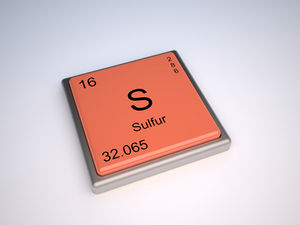Sulfur
From Health Facts
Latest Edit: Hector 2014-03-17 (EDT)
| See Also | Minerals |
|---|
Sulfur is a mineral found in the body which is an important component of cysteine, methionine, taurine, and glutathione. It is also a component of biotin and vitamin B1. It is used in the treatment of aluminum, cadmium, mercury, and lead poisoning.[1].
Contents
Food Sources
The following foods are natural sources of sulfur. For a more expansive list on food sources of specific nutrients visit Health Canada's Dietary Reference Intakes for Elements or USDA's National Nutrient Database
Other food sources include:[2]
- grains: wheat germ
- protein sources: fish, lean beef and other meats, poultry
- vegetables: legumes
- dairy: eggs, milk
- Other sources include: garlic
Uses
The following are the primary uses for sulfur: [1]
- Protection against toxic substances
- Arthritis: may reduce the symptoms of arthritis.
- Allergies: Methyl sulfonyl methane has been use to treat allergies.
Deficiency Symptoms
There are no proven symptoms of sulfur deficiency.
Excess Symptoms
Unlikely to threaten life or cause significant symptoms[1]
Assessment Procedure
There are no available lab tests to detect deficiency.
Prescribing Considerations
- The recommended dosages varies based on age and health status. To determine what your specific requirements are talk to your naturopathic doctor or other trained medical professional.
Safety
- Adults Over 55 Years: No problems are expected.
- Pregnancy: No problems are expected.
- Breastfeeding: No problems are expected.
Drug Interacations
- Drug Interactions include: None are known [1]
Other Interactions
- Other Interactions include: [1]
- Tobacco - Decreases absorption of sulfur. Smokers may require supplementation.

